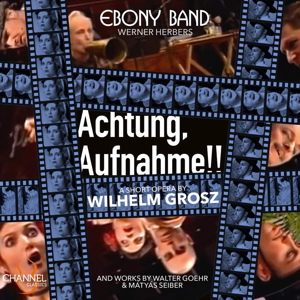
Wilhelm Grosz (1894-1939)
Achtung, Aufnahme!! (c.1930)
Walter Goehr (1903-1960)
Komödien in Europe (1930, potpourri arr. Werner Herbers)
Mátyás Seiber (1905-1960)
Die vertauschten Manuskripte (1930-1931, potpourri arr. Werner Herbers)
Ebony Band/Werner Herbers
Cappella Amsterdam/Daniel Reuss
rec. 1999-2005, Concertgebouw & Paradiso, Amsterdam, The Netherlands
Texts and translations included
Channel Classics CCS46823 [68]
This is the last recorded Will and Testament of Werner Herbers (1940-2023), erstwhile principal oboist of the Concertgebouw Orchestra for over three decades, and a member of the august Netherlands Wind Ensemble, whose recordings were so memorably restored recently by Eloquence. After the wind ensemble broke up he devoted himself to the Ebony Band which focused on the restoration of music from the first half of the twentieth century. Their CDs were invariably well received and explored valuable music almost always of the kind labelled ‘degenerate’ by the Nazis – less well-remembered musical cousins of Ernst Krenek, Kurt Weill and Max Brand.
Such as, for example, the Austrian composer Wilhelm Grosz, whose short absurdist opera Achtung, Aufnahme!! (Standby… Shoot!) is the main focus of this release. Grosz studied in Vienna with Schreker and with Heuberger, the operetta master, before settling in Weimar Berlin. His Piano Concerto was premiered by Mengelberg in 1929 – Grosz playing the piano – and he made numerous recordings. He left Berlin for his home city in 1933, thence to London and finally America where, after all that, he suffered a fatal heart attack just after winning a lucrative contract with Warner Brothers (the notes say it was a multi-million-dollar contract). You may know his name through his popular songs Harbour Lights and Red Sails in the Sunset.
His librettist for Achtung, Aufnahme!! was Béla Balázs, who wrote the libretto for Bartók’s Duke Bluebeard’s Castle. The opera is officially a tragicomedy about the making of a film which is interrupted by a homicidal, love-struck student obsessed with the leading lady. The characters are nameless, merely designated by their roles – The Director, The Actress, The Actor, The Student and so on – and the interesting thing about Grosz’s musical style here is that it leans rather more to the post-Heuberger training of his youth than to the acidic tartness of Weill or the jazz-infused Krenek. Nevertheless, the subject matter is well suited to the operetta-like quality of the music and he employs a small band that does draw upon prevailing modish currents in hot dance and proto-jazz elements – you’ll hear the banjo, saxophones and muted trumpets for example – so that the compromise between operetta and popular dance rhythms is well judged.
Filmic melodrama also saturates the score in places, a very appropriate musical response, and there are many delightful touches such as the little piano fills, or the saxes underpinning the melody lines, or the snappy choruses. The motto of the score? ‘With real pain you can earn a lot’ is the nicely cynical conclusion of a work that makes an immediate appeal to the audience though, perhaps, it lacks a little in musical consistency.
Achtung, Aufnahme!! was recorded in the Concertgebouw back in 2005 whereas Walter Goehr’s Komödien in Europe was taped earlier, in the Paradiso, Amsterdam in 1999. Goehr is best known as a conductor but he had studied with Schoenberg in Berlin and was active in writing music for film, radio and theatre. The twelve-minute orchestral potpourri from Goehr’s revue, which featured a text by Ferdinand Lion (who had written the libretto for Hindemith’s Cardillac), was fashioned by Herbers and makes for peppy, invigorating listening. The ethos here is late 1920s hot dance band with bluesy hues, songful sax lines, a drum trap set, all the vernacular tapestry of the time and not wholly unrelated to Milhaud but without his more personal and deeper jazz awareness.
The final piece in this Weimar triptych is Mátyás Seiber’s musical radio play for soloists, choir and jazz band Die vertauschten Manuskripte, another potpourri collected by Herbers. There are two singing roles and one for speaker but there are no texts or translations in the booklet as there are for Achtung, Aufnahme!! The songs are jazzier than is the case for the Goehr and there are numerous mocking quotations – for example, Mastersingers – as well as operetta-ish elements once again. There’s a fine opportunity for the trombonist of the Ebony Band to prove his mettle and there are circling clarinet voicings too. This is another appealing example of the vogue for hot dance music in Berlin and this potpourri gives a good indication of the music’s vivacity. It was recorded in 2002.
Herbers directs his crack Ebony Band whilst the Capella Amsterdam is conducted by Daniel Reuss. The singers are fully inside their roles and sensitive to their mordant or satiric natures, whilst the bands play with accustomed energy and finesse. Herbers’s own booklet notes are full of pertinent detail, to which I am strongly indebted. With Herbers’s recent death, the curtain has come down on his Ebony Band, but his contribution to the music of the time will remain and we can all profit from his meticulous editorial industry and his idiomatic command of the material. If you like, say, Weill, Schulhoff, Milhaud, Toch or Jonny spielt auf, lend an ear to this and the many previous Ebony Band discs.
Jonathan Woolf
Help us financially by purchasing from


Soloists
Lilia Milek (soprano), André Post (tenor), Dirk Laplasse (tenor), Matthijs van der Woerd (baritone), Romain Bischoff (bass-baritone), Harry van der Kamp (bass), Franziska Hirzel (soprano), Terence Mirau (tenor), Daniel Reuss (speaker)


















